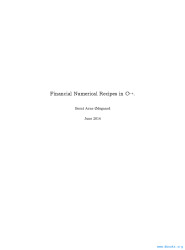Financial Numerical Recipes in C++
This project started when I was teaching a course in derivatives at the University of British Columbia, in the course of which I sat down and wrote code for calculating the formulas I was teaching. I have always found that implementation helps understanding these things. For teaching such complicated material it is often useful to actually look at the implementation of how the calculation is done in practice. The purpose of the book is therefore primarily pedagogical, although I believe all the routines presented are correct and reasonably efficient, and I know they are also used by people to price real options.
To implement the algorithms in a computer language I choose C++. My students keep asking why anybody would want to use such a backwoods computer language, they think a spreadsheet can solve all the worlds problems. I have some experience with alternative systems for computing, and no matter what, in the end you end up being frustrated with higher end "languages", such as Matlab og R (Not to mention the straitjacket which is is a spreadsheet.) and going back to implementation in a standard language. In my experience with empirical finance I have come to realize that nothing beats knowledge a real computer language. This used to be FORTRAN, then C, and now it is C++. All example algorithms are therefore coded in C++. I do acknowledge that matrix tools like Matlab are very good for rapid prototyping and compact calculations, and will in addition to C++ in places also illustrate the use of Matlab, as well as other (public domain) tools.
Table of contents
- On C++ and programming
- Matrix Tools
- The value of time
- Bond Pricing with a flat term structure
- The term structure of interest rates and an object lesson
- The Mean Variance Frontier
- Futures algoritms
- Binomial option pricing
- Basic Option Pricing, the Black Scholes formula
- Warrants
- Extending the Black Scholes formula
- Option pricing with binomial approximations
- Finite Differences
- Option pricing by simulation
- Pricing American Options - Approximations
- Average, lookback and other exotic options
- Generic binomial pricing
- Trinomial trees
- Alternatives to the Black Scholes type option formula
- Pricing of bond options, basic models
- Credit risk
- Term Structure Models
- Binomial Term Structure models
- Interest rate trees
- Building term structure trees using the Ho and Lee (1986) approach
- Term Structure Derivatives
- Date (and time) revisited - the BOOST libraries
| Pages : | 264 |
| Size : | 1.4 MB |
| File type : | |
| Downloads: | 146 |
| Created: | 2022-02-02 |
| License: | Open Publication License |
| Author(s): | Bernt Arne Ødegaard |

Warning: Trying to access array offset on false in /home/tutovnfz/public_html/article.php on line 233
Others c++ Tutorials
Structured programming with C++
Pro TBB: C++ Parallel Programming with Threading Building Blocks
Others related eBooks about Financial Numerical Recipes in C++
Classical Object-Oriented Programming with ECMAScriptDownload free course Classical Object-Oriented Programming with ECMAScript, pdf file on 23 pages by Mike Gerwitz....
A Python Book: Beginning Python, Advanced Python, and Python ExercisesDownload ebook Python tutorial, Python exercices, free PDF course by Dave Kuhlman....
Think Python - How to Think Like a Computer ScientistThink Python is an introduction to Python programming for students with no programming experience. It starts with the most basic concepts of programming, and is carefully designed to define all terms when they are first used and to develop each new concept in a logical progression. Larger pieces, ...
Hands-on Python TutorialPython is a widely used general-purpose, high-level programming language. Its design philosophy emphasizes code readability, and its syntax allows programmers to express concepts in fewer lines of code than would be possible in languages such as C. The language provides constructs intended to enable...
Think DSP: Digital Signal Processing in PythonThis book is an introduction to signal processing and system analysis using a computational approach, using Python as the programming language. The premise of this book (like the others in the Think X series) is that if you know how to program, you can use that skill to learn other things. By the ...
The Official Raspberry Pi Handbook 2022Download free course The Official Raspberry Pi Handbook 2022, pdf file on 204 pages by Wes Archer, David Crookes, PJ Evans, Gareth Halfacree, Rosie Hattersley, Phil King, Nicola King, KG Orphanides....
Building Skills in Python: A Programmer's Introduction to PythonThis book is a complete presentation of the Python language. It is oriented toward learning, which involves accumulating many closely intertwined concepts. In our experience teaching, coaching and doing programming, there is an upper limit on the "clue absorption rate". In order to keep within thi...
R Language tutorial, The Basic ManiuplationThe purpose of this course is to provide a starting point for Interested in R language. It is useful For the beginner to assimilate certain notions and concepts in order to improve their knowledge....
: Advanced RIt is impossible to become expert in R in only one training course. Yet, this course aims at giving a wide understanding of many aspects of R. Some external resources will be referred to in this book for you to be able to deepen what you would have learned in this course....
.NET MicroservicesThis guide is an introduction to developing microservices-based applications and managing ..., download free .NET tutorial in PDF (350 pages) created by Mike Rousos ....